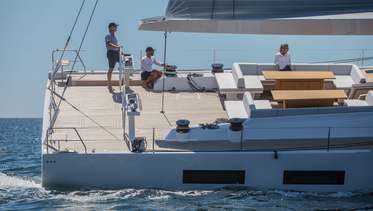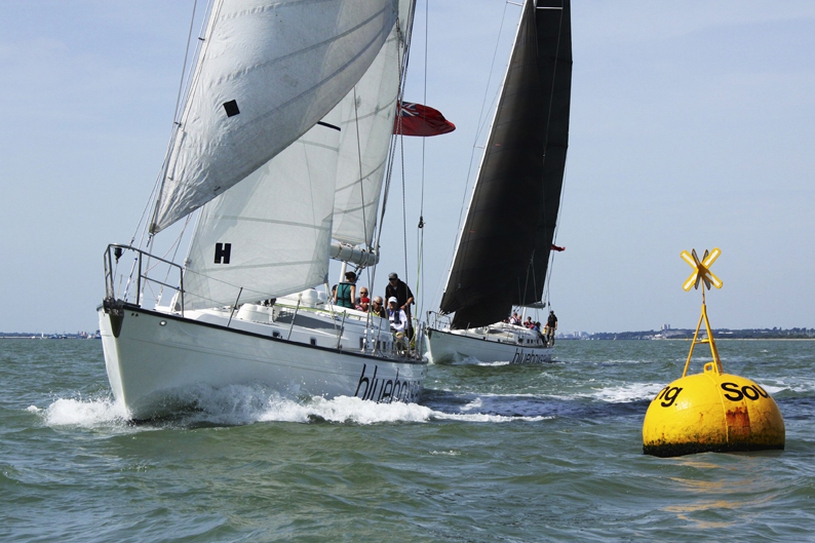
Chef/Stew
Boat type: 80f Sailing Boat
Location: Malaysia

Former Chief Examiner of the RYA and author of the RYA Yachtmaster Handbook, James Stevens explains why the RYA Yachtmaster qualification is so well regarded.
You can spot an incompetent skipper from the other side of the marina. Shouting is the first clue, followed by confusion on deck as the crew wonder what will happen next. Huge bursts of throttle indicate there is trouble ahead and yacht owners in the firing line are well advised to put extra fenders out. A weak skipper creates an unhappy yacht for all on board and their demoralised crew will soon give up sailing or move to another yacht.
Conversely it is always a pleasure to sail with a competent skipper. The crew are well informed, well fed, relaxed and know what is expected of them. Arriving in port is a pleasure rather than an anxiety. Problems are anticipated and solved well before they become serious.
The solution to incompetence is knowledge and experience. The RYA has developed a training programme and system of assessments, the Yachtmaster scheme, which can teach the beginner how to skipper a yacht and provides a globally recognised benchmark of competence for both amateurs and professionals.
The holder of a Yachtmaster qualification can skipper a yacht, lead the crew and deal with both plain sailing and emergencies. Navigation, pilotage, weather, collision avoidance and seamanship are all covered in detail in the syllabus. As well as knowledge an important part of the preparation is gaining sea miles and sailing in a variety of conditions in a variety of places by day and night. The aspiring skipper is well advised to seek as much pre-exam sailing experience on as many different boats as possible. Crewing on other people’s boats offers exposure to different skippering styles as well as the benefit of time spent aboard.
RYA Yachtmaster – a worldwide yachting certificate.
The RYA Yachtmaster is the best known and most recognised yachting qualification in the world. It originated in the UK but is now accepted for commercial work by many countries and is incorporated into the maritime legislation of Australia and New Zealand. The RYA has expanded its network of recognised sea schools to 50 countries in Europe, North America, Asia and Australasia.
Recognised Training centres can run a series of RYA shorebased and practical courses leading to Yachtmaster including Competent Crew, Day Skipper, Coastal Skipper, sea survival, first aid and Short Range Certificate (radio operator). Their vessels are inspected annually by the RYA and are required to comply with high standards of construction and equipment.
The Yachtmaster qualification is administered by the RYA on behalf of the UK Maritime and Coastguard Agency, an executive arm of the Department for Transport. As in the driving licence and pilot’s licence, the Yachtmaster is independently and practically examined by examiners who have no connection with the training.
About 3500 yachtsmen and women qualify as yachtsmasters each year, 80% of whom use the qualification commercially as professional skippers and mates.
What is a Yachtmaster and what are the pre entry requirements?
There are three levels of Yachtmaster which can be held for sail or power vessels.
1. A Yachtmaster Coastal is qualified to skipper yachts up to 24m on passages up to 20 miles from a safe haven
2. A Yachtmaster Offshore is qualified to skipper yachts up to 150 miles from a safe haven
3. A Yachtmaster Ocean is qualified to skipper yachts worldwide
Coastal and Offshore Yachtmasters are assessed by a one day practical examination at sea in a sailing or motor yacht. The Ocean exam is a 3 hour oral test.
Prior to the exam candidates must gain experience in yachts and hold some pre-entry certificates.
Yachtmaster Coastal
Experience: 800 miles 30 days on board, 2 days as skipper and 12 night hours (reduced to 400 miles, 20 days 12 night hours and 2 days as skipper for holders of an RYA Coastal Skipper practical course Completion Certificate). Pre-entry Certificates; SRC, First aid
Yachtmaster Offshore
Experience: 50 days 2,500 miles including five passages over 60 miles acting as skipper for two and including two overnight. Five days as skipper. At least half experience must be in tidal water. Pre-entry certificates; SRC, First Aid
Yachtmaster Ocean
Experience: Ocean passage (600 miles). Pre entry certificates; Yachtmaster Offshore.
Full details, definitions of the passages and the types of eligible vessels are included in the RYA Yachtmaster Scheme syllabus and logbook G158 available from the RYA.
Commercial endorsement
Skippers wishing to have their Yachtmaster qualification Commerically Endorsed to allow them to operate in a commercial environment must, in addition to the above hold; a Sea Survival certificate (usually RYA sea survival) a one day course involving a session in a swimming pool; the RYA Professional Practices and Responsibilities certificate – an online course taken through a recognised centre.; and a Medical fitness certificate – usually ML5 provided by an MCA recognised doctor. Commercial endorsements must be revalidated every five years.
Gaining Experience
To pass a Yachtmaster exam you must have skills and experience. Sailing schools can give you the skills, but you need to get miles under your belt as well. Sailing with a variety of skippers is a real help in finding out the wrinkles and skills needed to take charge of a yacht. Crewseekers can put you in touch with skippers needing crew all over the world, and once you are qualified Crewseekers can help you get work too, and provide you with crew.
How do I book the exam?
Most candidates take Yachtmaster prep training course at a sailing school, giving themselves a much greater chance of success, and the sailing school will organise an independent examiner for them. It is however possible to take the exam on your own boat which must be well equipped and fully charted. You provide the crew as the examiner does not take part in running the yacht except providing the occasional cup of tea if you are lucky. Also, part of the test is managing the crew. The RYA website gives details of how to book directly with the RYA and the cost of the exam in different parts of the world.
What happens during an exam?
For the practical exams the examiner will meet you on board and start by asking about your experience and will check you have the correct certificates and mileage. The examiners job is to give you the opportunity to demonstrate that you know how to skipper a yacht. There are no trick questions and as far as possible the yacht, the weather and the sea provide the test rather than artificial scenarios. The only surprise will be the man overboard practice when a fender and bucket will disappear over the side when you are least expecting it. Discuss with the examiner beforehand whether you are expected to sail back or can use the engine.
The examiner will ask each candidate (there can be up to four over two days) to sail a short passage although you will probably be asked to plan a longer one as well. It isn’t cheating to have looked up the tides earlier – you choose the day and the venue – there are enough variables without worrying about information you can gain in advance. The examiner will probably say “skipper the yacht as you would normally”. If this means putting the kettle on regularly then do it.
Before leaving ensure the yacht is ready to go to sea and brief the crew. You will need to give a safety brief explaining how the kit works and when to use it.
The crew can help by competently doing what they are told. It doesn’t help for them to start giving advice, the examiner will continue the exam until he knows the candidate is competent rather than following the crew’s instructions. The skipper will normally be asked to do the boat handling and may be asked to do some additional manoeuvres under power and sail. Good boat handling always impresses examiners. Once you are away from the mooring supervise the sail setting and make sure you are happy with the trim and course. Sail efficiently, think through the sailing manoeuvres such as picking up a mooring and never gybe accidently.
You should have a good idea of the yacht’s position at all times. You will be asked to navigate and answer questions about the chart and tidal heights and streams. You will be expected to be able to navigate and pilot into a harbour traditionally on a paper chart as well as by GPS. Make sure you know which buttons to press on the electronic chart plotter.
Don’t spend all your time at the chart table though. Look where you are going and pick up visual clues such as buoys to confirm your position. If other vessels appear the examiner will ask about collision avoidance. During the exam you will be given a thorough test on the Colregs so spend time getting up to speed – examiners have to fail candidates who don’t know the rules.
Check the weather before and during the exam, you will be asked questions about how it affects your plans and what to expect. Seamanship, knots, stability and other subjects are tested orally. The examiner will also ask you about your preparation for a longer passage which is given to you in advance.
Passing and Failing
The examiner will be looking for a skipper who is in charge of the boat and crew and who runs a relaxed happy ship. Conversely a skipper who gives the examiner and crew an uneasy feeling down the back of the spine is unlikely to pass – you don’t have to be an examiner to spot lack of knowledge and inexperience.
Your best chance of passing is to gain experience as crew and skipper, get up to speed on the theory and practice the manoeuvres such as coming alongside and moorings which you know will come up during the exam. During the test, talk to the examiner to make sure you know what is expected and give it your best shot. If you make a mistake, stay in control and sort it out – it’s not the end of the exam, the examiner may be impressed by your ability to solve the problem.
No one gives a perfect performance but around 90% of candidates pass – with the right training and experience you can too.
Additional reading
RYA Yachtmaster Scheme Syllabus and Logbook G158
RYA Yachtmaster Handbook a guide to the Exam
Both available from RYA www.rya.org.uk.
Qualifications, experience, endorsements and other aspects of this information can change on a regular basis - for the very latest information consult:
Crewseekers is run by experienced, professional sailors offering a friendly and helpful service to yacht crew and owners. We are the original yacht crew introduction agency – established for over 25 years, offering amateur and professional sailing opportunities throughout the world.
Read our story